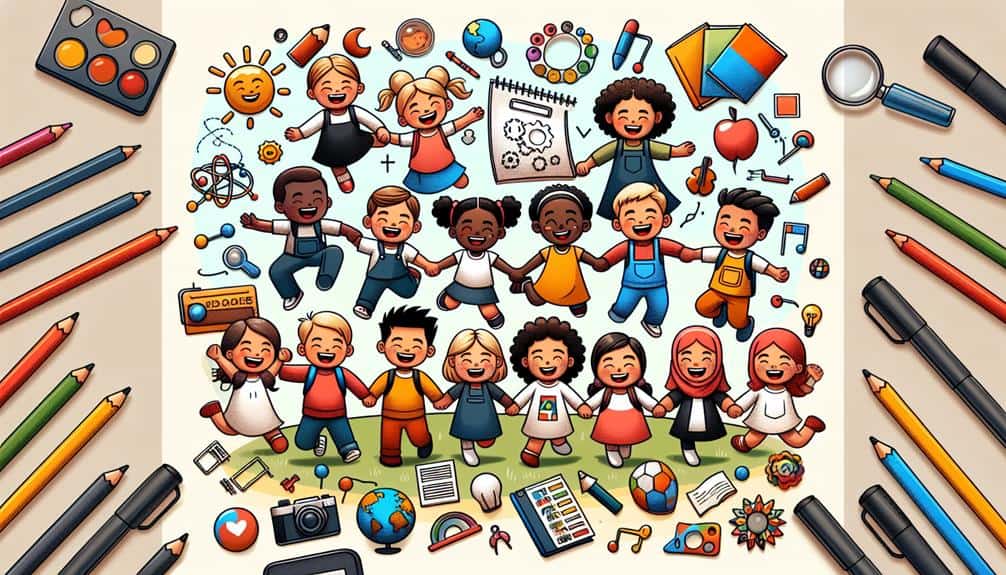Discover the top 10 resources empowering unschooling and educational freedom. Benefit from tailored learning paths, legal compliance tips, and personalized curriculum options. Engage with supportive communities, online forums, and valuable parenting books for unschooling. Gain insights from success stories and advocacy initiatives revolutionizing education. Explore how self-directed education fosters passion for learning and academic excellence, showcasing the impact beyond traditional measures. Harness the power of unschooling networks and support for your educational journey towards personalized, impactful learning experiences.
Key Points
- Alliance for Self-Directed Education and NHERI for advocacy.
- Online forums and virtual meetups for support.
- Insightful books on unschooling principles and practices.
- National Home Education Research Institute for research.
- Local meetups and community events for networking.
Benefits of Unschooling
Unschooling offers numerous benefits for students, allowing educational freedom through flexibility and personalized learning opportunities. One of the primary advantages of unschooling is the ability for students to customize their education to their interests and passions. This tailored approach enables learners to explore in depth subjects that captivate them, fostering a genuine love for learning.
Moreover, unschooling provides the flexibility for students to learn at their own pace, without the constraints of a predetermined curriculum. This freedom empowers individuals to investigate topics thoroughly, ensuring a well-rounded understanding that goes beyond rote memorization.
Legal Requirements for Unschooling
Compliance with state laws regarding education is vital for families choosing alternative forms of schooling. When it comes to unschooling, understanding the legal requirements is essential to guarantee that you're meeting the necessary standards.
Homeschool regulations vary from state to state, so it's imperative to research and adhere to the specific laws in your area. In most states, parents who choose to unschool their children must meet certain legal requirements such as filing a letter of intent to homeschool, maintaining records of educational activities, and participating in any required assessments or evaluations.
Some states may also have specific subjects that need to be covered or minimum hours of instruction per year. To avoid any potential legal issues, make sure to stay informed about the homeschool regulations in your state and keep detailed records of your child's educational journey.
Unschooling Curriculum Options
Understanding the various curriculum options available is a crucial aspect of successfully managing the unschooling approach. When exploring unschooling resources, it's important to recognize that unlike traditional homeschooling, unschooling doesn't follow a pre-set curriculum. Instead, unschooling encourages a personalized learning approach tailored to the individual interests and pace of each child.
In contrast to the structured curriculum often associated with homeschooling, unschooling allows children the freedom to pursue their passions and interests, guiding their own educational journey. This flexibility enables children to explore deeply into subjects that spark their curiosity, fostering a love for learning that extends beyond textbooks and standardized tests.
While unschooling curriculum options may not adhere to conventional standards, there are resources available to support parents in facilitating their child's education. By embracing the personalized learning approach of unschooling and comparing it to traditional homeschooling methods, families can make informed decisions about the most suitable educational path for their children.
Support Groups for Unschoolers
Engage with like-minded individuals and access valuable resources by joining support groups tailored for unschoolers. Unschooling meetups provide a platform for families following this educational approach to connect, share experiences, and exchange ideas. These gatherings offer a supportive environment where parents and children can interact, fostering a sense of community among unschooling families.
Community connections play a crucial role in unschooling, offering socialization opportunities and a network of support. By joining local support groups, unschoolers can participate in group activities, field trips, and learning opportunities that complement their educational journey. These connections not only provide social interactions for children but also offer parents a chance to discuss challenges, seek advice, and share resources with like-minded individuals.
Support groups for unschoolers are instrumental in creating a sense of belonging and understanding for families choosing this educational path. Through these community connections, unschooling families can thrive, learn, and grow together in a supportive environment.
Online Unschooling Communities
Joining online unschooling communities provides a convenient platform for families to connect and access resources from the comfort of their homes. These communities offer a wealth of support, information, and networking opportunities for those embracing unschooling as an educational approach.
Here are some key benefits of engaging with online unschooling communities:
- Virtual meetups: Online unschooling communities often organize virtual meetups where families can interact, share experiences, and learn from one another. These meetups can be a great way to foster a sense of community and provide support to unschooling families.
- Online forums: Many online unschooling communities have dedicated forums where members can ask questions, seek advice, and engage in discussions on various unschooling topics. These forums serve as valuable platforms for exchanging ideas and getting insights from experienced unschoolers.
- Social media and digital resources: Online unschooling communities leverage social media platforms and digital resources to disseminate information, share educational materials, and connect with a broader audience. These resources can be instrumental in guiding families through their unschooling journey and providing them with the necessary tools for success.
Unschooling Blogs and Podcasts
Explore a diverse range of perspectives and insights on unschooling by delving into impactful unschooling blogs and podcasts. Unschooling blogs offer a wealth of knowledge and experiences shared by parents, educators, and unschooling advocates. They provide practical tips, personal stories, and valuable resources for those interested in alternative education approaches.
Some recommended unschooling blogs include 'The Natural Child Project,' 'SandraDodd.com,' and 'Racheous – Lovable Learning.' These platforms foster a sense of community engagement, allowing readers to connect, share ideas, and seek support in their unschooling journey.
When it comes to unschooling podcasts, they offer a convenient way to listen to insightful discussions and interviews related to educational freedom. Podcasts like 'Exploring Unschooling' and 'The Unschooling Life' feature conversations with unschooling experts, parents, and children, providing listeners with a deeper understanding of unschooling principles and practices. These podcasts are valuable unschooling resources that cater to different learning styles and preferences, making them a great addition to your educational toolkit.
Unschooling Books for Parents
You'll find an essential unschooling booklist that covers a range of topics important to your educational journey.
These books provide valuable insights, strategies, and inspiration to help you navigate the unschooling path successfully.
Additionally, they offer parenting support and guidance tailored to the unique challenges and joys of unschooling.
Essential Unschooling Booklist
When exploring the world of unschooling, equipping yourself with essential books can provide valuable insight and guidance for parents exploring this educational philosophy. Here are three highly recommended reads that can help deepen your understanding of unschooling and homeschooling options while embracing educational freedom:
- 'The Unschooling Handbook: How to Use the Whole World as Your Child's Classroom' by Mary Griffith – This detailed guide offers practical advice on how to implement unschooling successfully, emphasizing the importance of personalized learning experiences outside traditional schooling structures.
- 'Free to Learn: Why Unleashing the Instinct to Play Will Make Our Children Happier, More Self-Reliant, and Better Students for Life' by Peter Gray – This book explores the benefits of self-directed learning and the role of play in education, advocating for a more natural approach to learning.
- 'Dumbing Us Down: The Hidden Curriculum of Compulsory Schooling' by John Taylor Gatto – Gatto critiques the conventional education system and advocates for educational freedom, making a compelling case for alternative learning paths such as unschooling.
Parenting Support Through Books
Parental guidance and support can be enhanced through a selection of insightful books tailored to the principles and practices of unschooling, providing valuable resources for parents navigating this educational pathway.
When seeking parenting guidance in the domain of unschooling, it's essential to explore books that offer practical advice, inspiration, and strategies to navigate the challenges and joys of this educational approach. These resources not only explore the core principles of unschooling but also provide valuable insights into fostering a supportive and enriching learning environment at home.
Educational freedom is at the heart of unschooling, and through carefully curated book recommendations, parents can gain a deeper understanding of how to nurture their child's natural curiosity and facilitate authentic learning experiences. By immersing yourself in these unschooling resources, you can discover innovative ways to empower your child, cultivate a love for learning, and embrace the flexibility and creativity that unschooling offers.
Embracing these book recommendations can equip you with the knowledge and confidence to embark on a fulfilling unschooling journey with your child.
Unschooling Success Stories
Explore the real-world impact of unschooling through inspiring success stories that showcase the triumphs of this educational approach.
These narratives not only highlight the effectiveness of unschooling but also serve as empowering examples for parents considering alternative education paths.
Unschooling Triumphs in Action
Achieving academic excellence through unschooling stands as proof of the efficacy of personalized, self-directed learning paths. Unschooling innovations and student-led learning have led to remarkable success stories, showcasing the power of educational liberation and self-directed education.
Here are some inspiring examples:
- Ivy League Acceptance: Several unschooled students have gained admission to prestigious universities like Harvard and Stanford, demonstrating that unconventional educational methods can lead to traditional academic success.
- Entrepreneurial Ventures: Unschooling has nurtured a spirit of creativity and innovation in many individuals, leading them to establish successful businesses at a young age based on their unique interests and passions.
- Global Impact: Unschooling success stories extend beyond traditional measures of achievement, with graduates making significant contributions to society in various fields, from art and technology to environmental activism, proving that self-directed education can lead to fulfilling and impactful lives.
These examples illustrate how unschooling can empower individuals to excel academically and make a meaningful difference in the world by embracing personalized, student-led learning paths.
Empowering Unschooling Narratives
Illustrating the transformative power of unschooling, these empowering narratives showcase the remarkable successes achieved through student-led, self-directed education. By highlighting individuals who've thrived outside traditional schooling structures, these narratives emphasize the significance of educational autonomy in shaping unique paths to success. Through empowering narratives, unschooling advocates demonstrate the diverse avenues through which learners can excel when given the freedom to explore their own educational journeys.
These stories often feature individuals who've pursued unconventional interests, delved deeply into self-directed projects, and engaged with real-world experiences to cultivate a rich and personalized learning environment. From young entrepreneurs launching successful businesses to artists honing their craft independently, these empowering narratives underscore the boundless possibilities that arise when individuals are empowered to take charge of their own education.
Impactful Unschooling Experiences
Unpacking the tangible outcomes of unschooling, real-life success stories illuminate the profound impact of student-led education on individuals' academic and personal development. These impactful unschooling stories showcase how unconventional learning approaches can lead to remarkable achievements despite facing unschooling challenges.
Here are three inspiring unschooling success stories:
- Ella's Entrepreneurial Journey: Ella, an unschooled teenager, started her own successful online business selling handmade jewelry. Through unschooling, she developed not only business skills but also creativity and self-confidence.
- Sam's Scientific Exploration: Sam, who unschooled through high school, pursued his passion for science by conducting independent research projects. His unschooling experience allowed him to explore in-depth into topics that fascinated him, preparing him for a successful academic career in the scientific field.
- Aisha's Artistic Pursuits: Aisha, despite facing societal skepticism about unschooling, honed her artistic talents through self-directed learning. Her journey showcases how unschooling can nurture individual passions and talents, leading to a fulfilling career in the arts.
Unschooling Vs. Traditional Education
When comparing unschooling to traditional education, it's essential to contemplate the fundamental differences in approach and philosophy. Unschooling emphasizes self-directed learning, allowing children to pursue their interests at their own pace. This approach often leads to increased motivation, creativity, and a deeper love for learning, which are significant unschooling benefits.
On the other hand, traditional education typically follows a structured curriculum, focusing on standardized testing and predetermined learning outcomes. This can sometimes result in challenges such as disengagement, lack of individualized attention, and limited opportunities for creativity and critical thinking, which are traditional challenges.
Unschooling encourages exploration and hands-on experiences, fostering a strong connection between learning and real-life applications. In contrast, traditional education tends to prioritize memorization and academic performance. While unschooling promotes holistic learning and personal growth, traditional education aims to impart a standardized body of knowledge.
Understanding these distinctions can help individuals make informed decisions about the educational approach that best aligns with their values and goals.
Advocacy Organizations for Educational Freedom
You should consider the significance of key advocacy groups that champion educational freedom. These organizations often spearhead impactful initiatives that shape policies and practices.
Key Advocacy Groups
Exploring the landscape of educational freedom reveals a network of key advocacy groups dedicated to promoting unschooling and alternative learning methods. These organizations play an essential role in championing parental rights and engaging in policy advocacy to support educational freedom.
Here are three influential advocacy groups:
- HSLDA (Home School Legal Defense Association): HSLDA is a prominent organization that provides legal support and resources to homeschooling families, advocating for parental rights and defending homeschooling freedoms.
- Alliance for Self-Directed Education: This advocacy group focuses on promoting self-directed education, including unschooling, and works towards creating a society where children have the freedom to learn in ways that suit their individual needs and interests.
- National Home Education Research Institute (NHERI): NHERI conducts research on homeschooling and alternative education, providing valuable data to support policy advocacy efforts and empower parents in their educational choices.
These key advocacy groups are instrumental in advancing the cause of educational freedom and supporting families who choose alternative learning paths.
Impactful Initiatives
An examination of impactful initiatives within advocacy organizations for educational freedom reveals significant efforts to promote alternative learning methods and defend parental rights. These organizations are known for their innovative approaches, working towards revolutionizing traditional education systems. By championing educational alternatives, they seek to empower parents and students to explore diverse learning paths that align with individual needs and interests.
Through grassroots movements, these advocacy organizations aim to cultivate a community impact by raising awareness about the importance of educational freedom and fostering a sense of empowerment among families.
One notable initiative is the implementation of pilot programs that showcase the effectiveness of unconventional teaching methods and customizable curriculums. By demonstrating the success of these initiatives, advocacy organizations can advocate for broader adoption of alternative learning approaches within mainstream education systems.
Additionally, these groups often organize workshops, seminars, and community events to engage with parents, educators, and policymakers, fostering a collaborative effort towards educational liberation.
Supportive Networks
Highlighting the collaborative efforts and impact of advocacy organizations for educational freedom, supportive networks play a pivotal role in empowering families and promoting alternative learning methods. These networks provide essential resources, guidance, and a sense of community for those seeking educational freedom.
Here are three key ways in which supportive networks, such as advocacy organizations, can benefit you:
- Local Meetups: These in-person gatherings offer a valuable opportunity to connect with like-minded individuals in your area, share experiences, and access local resources that can enhance your educational journey.
- Online Forums: Virtual platforms provide a space for ongoing discussions, sharing of ideas, and support from a diverse group of individuals who are also exploring alternative education paths. These forums can offer a wealth of information and advice at your fingertips.
- Advocacy Organizations: These groups work tirelessly to advocate for educational freedom, lobbying for policy changes, and providing educational resources and support to families pursuing unconventional learning approaches. Joining such organizations can amplify your voice and contribute to the broader movement towards educational empowerment.
Frequently Asked Questions
How Can Unschooling Accommodate Children With Learning Disabilities?
To accommodate children with learning disabilities in unschooling, individualized support and accommodations are key. Tailor curriculum to their specific needs and learning styles. By personalizing their educational journey, you can help them thrive.
Are There Any Unschooling Resources Specifically for High Schoolers?
For high schoolers in unschooling, independent study is key. Look for resources that focus on college preparation, such as online courses or dual enrollment programs. These can help you build a strong academic foundation for future success.
Can Unschooling Be Successful for Families With Multiple Children?
Juggling sibling dynamics in unschooling can be a delicate dance. Time management becomes essential to make sure each child's needs are met. Balancing individual interests while fostering a collaborative learning environment can lead to success.
What Strategies Can Unschooling Parents Use to Track Progress?
To track progress in unschooling, use portfolio assessment for a tangible record of achievements. Set goals collaboratively with your children and document learning in journals. Encourage self-assessment for personal growth and continuous improvement.
Are There Any Unschooling Resources for Teaching Specific Subjects Like Math or Science?
When teaching specific subjects like math or science in unschooling, look for resources that align with your child's interests. Utilize online platforms, educational games, real-world applications, and community resources to provide engaging and effective learning experiences.



